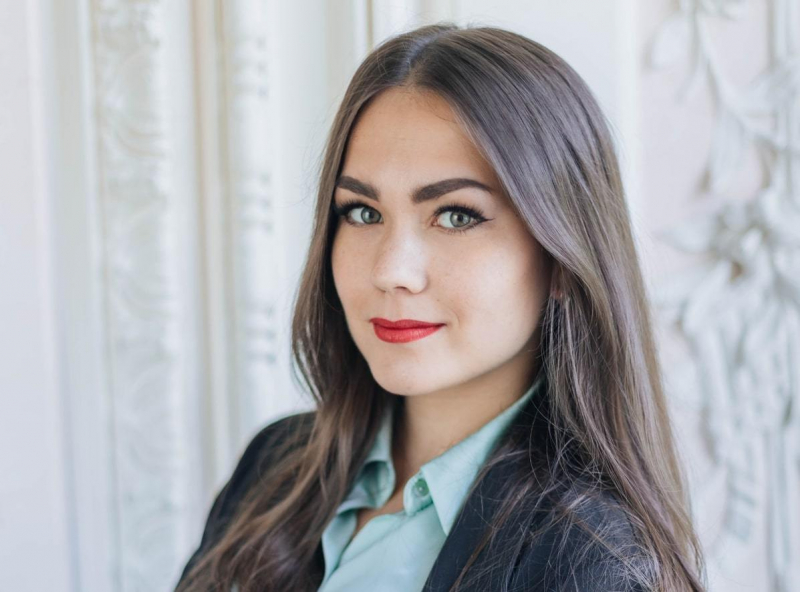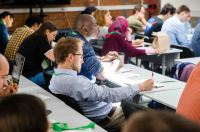Where did you go for your academic exchange?
I’ve studied small business administration for my Bachelor’s and quality management for my Master’s at ITMO’s Faculty of Technological Management and Innovations, and over my six-year studies here, I’ve participated in academic exchange four times. First, I went to Oulu University of Applied Sciences in Finland to study management and marketing. Then, I continued to study management at the University of West Bohemia and Wroclaw University of Science and Technology and got back to marketing at the University of Lorraine in France. I also did my internship at the international department of the higher school of engineering at Mines Nancy.
Why did you choose these universities?
When selecting countries and universities, I paid special attention to educational programs on offer, my professional interests, potential outcomes I could further use in my thesis, and skills that would help land my dream job.
I chose Oulu University of Applied Sciences because my faculty worked closely with Finnish universities and it still does. I was excited to learn what it’s like to study in a different country. This was good practice since I got to take part in and even organize several workshops between Tampere University of Applied Sciences and ITMO University. The University of West Bohemia offered a great educational program, which was just for me as it included a good deal of disciplines that were similar to those I studied at ITMO. I read a bunch of positive reviews about Wroclaw University of Science and Technology. People said good things about their studies there, courses they studied, and their active student life – all this was important to me. I couldn’t even dream of going to France but winning an Erasmus+ grant got me a chance to study there, too.
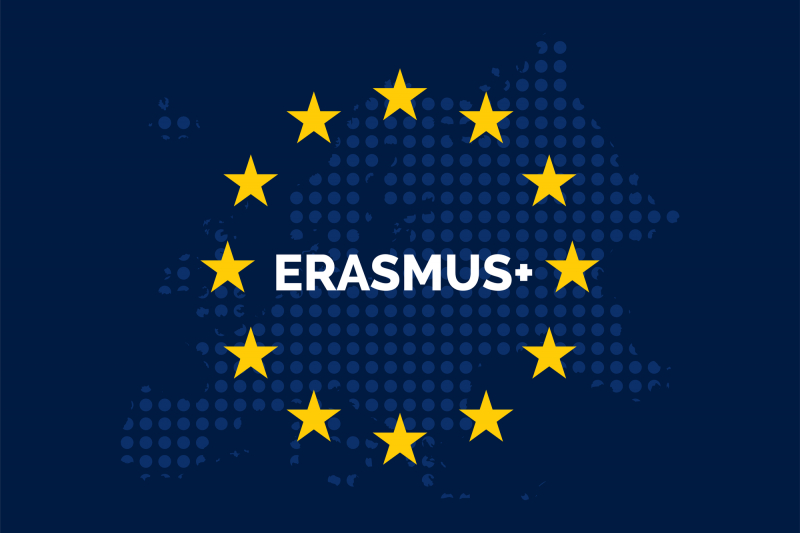
Credit: depositphotos.com
What did you need to do to get into a semester exchange program?
The selection process starts at ITMO. Twice a year, the International Educational Programs Office runs an internal competition for students wishing to study abroad. To participate in the contest, candidates must provide a video CV, a letter of motivation (if required), and an English proficiency certificate (minimum B2).
Having successfully passed the internal competition, you get nominated for partner universities. At this point, everything is up to these universities, not you. The representatives of universities review the candidates and thoroughly look into their backgrounds, experiences, academic and personal achievements, and so on. And from my experience, I can say that candidates do not always get into their first priority university. In my case, my background wasn’t a fit. If the university doesn’t nominate you for this or that reason, you receive nominations from other universities on your list.
In case you received a nomination and the host university confirmed it, your application is submitted via that university’s system, and you get an invitation. This is a rather common practice for all universities, the only difference can be in the list of documents you must provide.
I spent my last year of studies in France as an Erasmus+ student. I learned about the grant from ISU. The University of Lorraine invited prospective students for in-person interviews and those who aced the interview earned a grant. Several factors helped me win: my English was good, I’d been on exchange before, I was actively involved in student and academic life, I had multiple publications and projects, and I was also confident in myself and my abilities.
What is it like to study at a university abroad?
On the whole, studying at a foreign university is no different. Yet there, students, as a rule, understand better that they’re responsible for their own education, not the teachers. To become sought-after professionals, students need to study, attend lectures, and complete assignments, so they are the ones who create their future and no one is going to force them to study.
I’ve acquired most of my practical skills while studying in Finland and France. Throughout my studies, we had plenty of real-life projects. We met with investors and CEOs of various companies. I also took part in projects, the results of which were then assessed by sponsors.
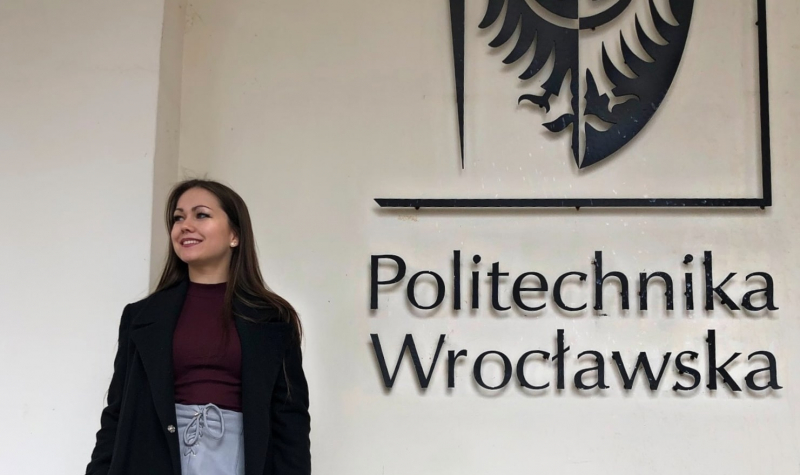
Yulia Shik at Wroclaw University of Science and Technology. Photo courtesy of the subject
What was your accommodation like in different countries?
Exchange students usually have several options to choose from: student residence (a kind of dormitory), a rented apartment, or another option recommended by the partner university. I always stayed at student residences, all of which were comfortable: the rooms were clean and cozy. Sometimes I had an apartment all to myself and on other occasions I shared one with other students. Accommodation in France and Finland is more expensive than in Czech Republic and Poland, but the apartments are noticeably more modern, minimalist, and comfortable. In Czech Republic and Poland, some products and services are much cheaper, just like rent, however, some services are of a higher quality.
Did you face any challenges while living and studying in other countries?
I didn’t have any problems communicating with people from different cultures – most students are open and understanding, so it was easy to find some common ground.
One of the biggest challenges for me was stepping out of my comfort zone and changing my daily routine. At first, you are really homesick; you want to give up and go back to St. Petersburg, but this feeling usually dissipates after about three weeks. During these periods, I found it helpful to have an active academic and social life, discover new places, and meet new people.
What benefits did you gain during your semester exchange?
These experiences helped me establish a work-life balance. Having studied at four different universities, I realized what I was truly passionate about, where I wanted to live, and how to develop further. For instance, I received five offers after six job interviews for positions with different salary expectations. I think I could do it because my employers noted my international experience, my professional skills, and my ability to use them in other languages. And I got it all from my exchange programs. I am currently working at ITMO’s International Educational Programs Office, just like I planned upon my return home.
Studying abroad also helps you meet lecturers and supervisors who will be happy to provide you with a letter of recommendation if you apply for a PhD.
Finally, the time you spend abroad can motivate you to reach new heights or try something new. When I came to France without knowing the language, I was inspired to learn it. As a result, when I came home, I found a tutor right away; even now, I still practice the language regularly.
I’ve done presentations, held negotiations with interesting people, and took part in important personal projects that I felt truly responsible for. All of this expanded my experiences, helped me grow as a person and have a more open-minded approach to some things.
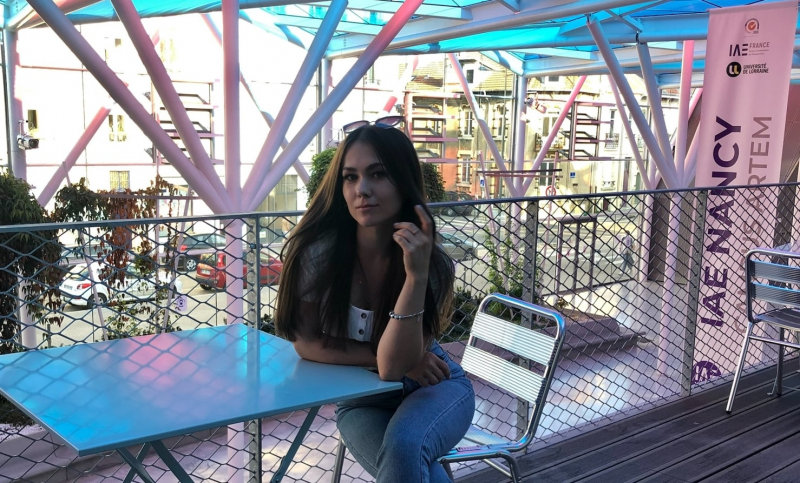
Yulia Shik on an exchange program in France. Photo courtesy of the subject
What advice will you give other students thinking about going on an exchange program?
First of all, set your goal for the exchange semester. This is crucial so that you don’t waste your time there.
Second, once you make up your mind about going, do not be afraid of any challenges – be they of an academic, bureaucratic, or any other nature. ITMO’s International Office is always ready to help students at any stage of their exchange experience.
Third, once you reach your destination, make the most of this experience: be open to any professional opportunities that you might later use at ITMO or in your future career, to new people, or to a chance to develop new personal qualities and expand your limits.
And, finally, don’t do everything right before the deadline. Yes, some people have a reliable system of doing everything at the last moment, but such systems do tend to malfunction. That’s why you should keep an eye on deadlines and avoid succumbing to laziness
